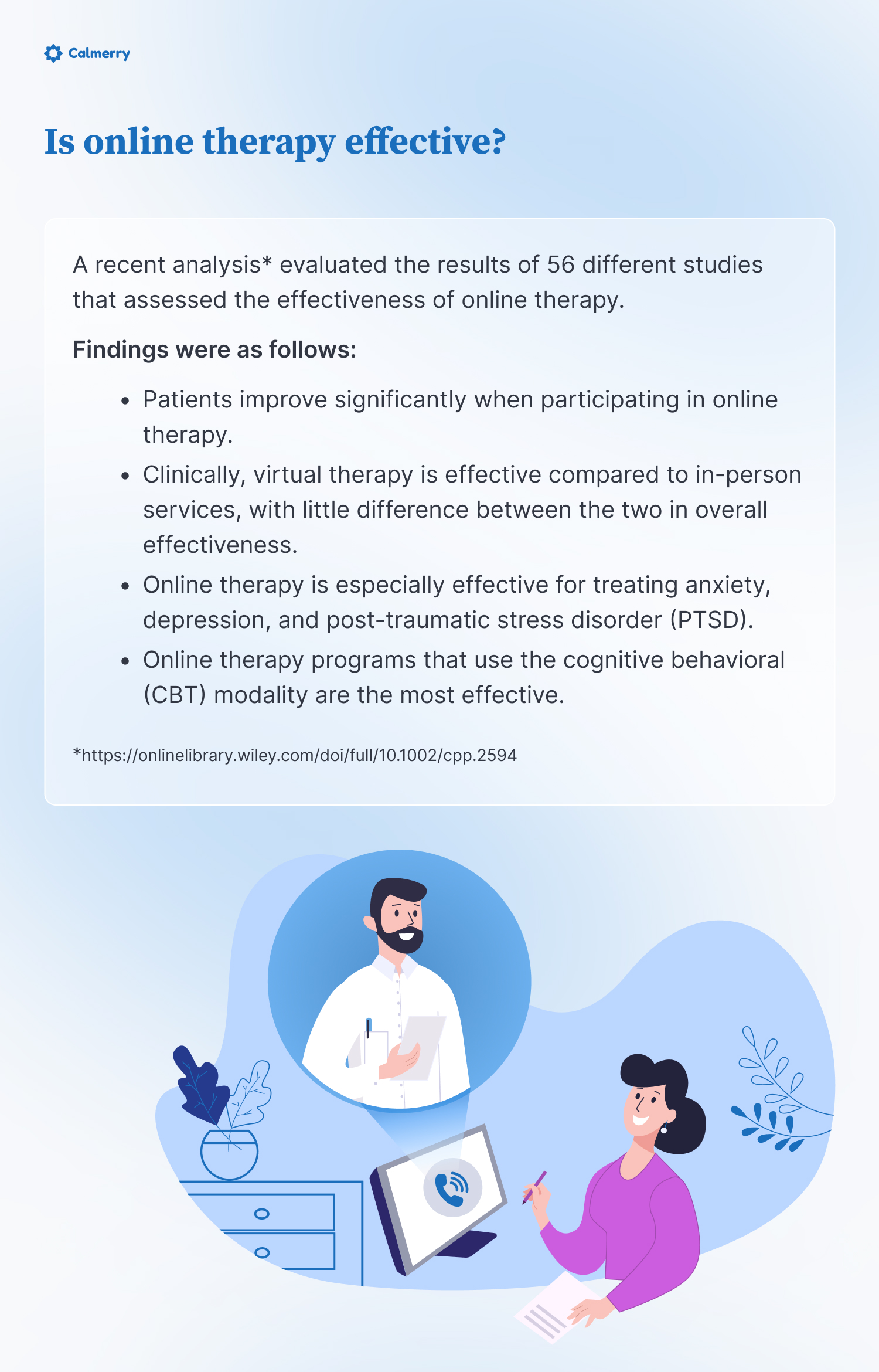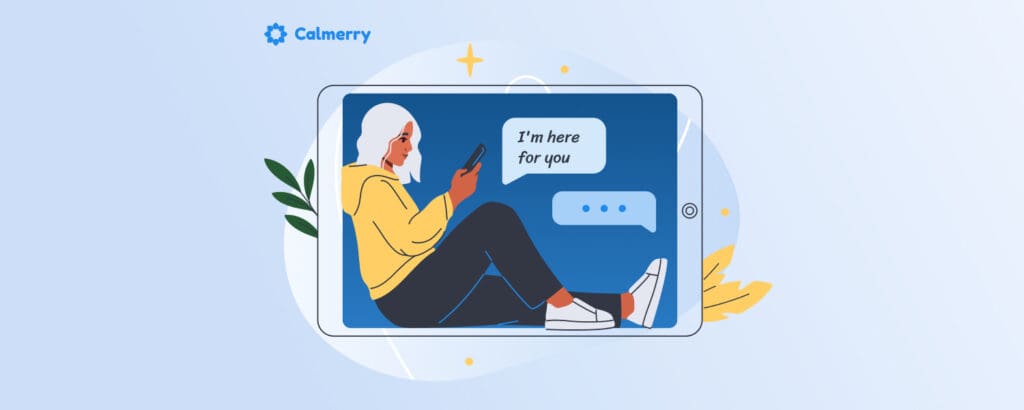Is Online Therapy Effective? Here’s What Research Says

In this article
During the COVID-19 pandemic, online therapy became a necessity. Stay-at-home orders often meant that people could not seek in-person behavioral healthcare, as in-office appointments were limited to situations of medical necessity.
While the pandemic certainly wasn’t ideal, it did give the behavioral health field an opportunity to evaluate the effectiveness of online therapy. [1] Giordano, C., Ambrosiano, I., Graffeo, M. T., Di Caro, A., & Gullo, S. (2022). The transition to online psychotherapy during the pandemic: a qualitative study on patients’ perspectives. Research in Psychotherapy Psychopathology Process and Outcome. https://doi.org/10.4081/ripppo.2022.638
In the aftermath of the pandemic, the online modality for therapy remains popular.
In fact, a study that involved 12,828 mental health treatment providers found that 88.1% of them were still offering virtual services as of September 2022, up from 39.4% in April 2019. [2] McBain, R. K., Schuler, M. S., Qureshi, N., Matthews, S., Kofner, A., Breslau, J., & Cantor, J. H. (2023). Expansion of telehealth availability for mental health care after State-Level policy changes from 2019 to 2022. JAMA Network Open, 6(6), e2318045. https://doi.org/10.1001/jamanetworkopen.2023.18045
It seems this modality is here to stay, but is online therapy effective?
Below, we explore what the research says.
By the way, Best Online Therapy Services researched how online therapy works on our platform and shared the process in this Calmerry review.

What is virtual therapy?
Online therapy is a way to get help from a therapist using the Internet in place of in-person meetings. A therapist can be reached via text message, phone call, or video call.
You can connect with a therapist from your home or anyplace you feel comfortable, which makes an online therapy convenient.
Virtual therapy provides more flexibility and accessibility while giving the same support and assistance as traditional therapy.
Research with online therapy
Since therapy is an important behavioral healthcare service, it’s essential to evaluate its effectiveness. This is certainly the case with online therapy, as clients receiving this service have a right to know the benefits and risks associated with it.
To determine the effectiveness of online therapy, it’s helpful to compare this modality to in-person services. Fortunately, plenty of research has done just that.
A recent analysis evaluated the results of 56 different studies that assessed the effectiveness of online therapy. Findings were as follows:
- Patients’ health improves significantly when participating in online therapy.
- Clinically, virtual therapy is effective compared to in-person services, with little difference between the two in overall effectiveness.
- Online therapy is especially effective for treating anxiety, depression, and post-traumatic stress disorder (PTSD).
- Online therapy programs that use the cognitive behavioral (CBT) modality are the most effective. [3] Fernandez, E., Woldgabreal, Y., Day, A., Pham, T., Gleich, B., & Aboujaoude, E. (2021). Live psychotherapy by video versus in‐person: A meta‐analysis of efficacy and its relationship to types and targets of treatment. Clinical Psychology & Psychotherapy, 28(6), 1535–1549. https://doi.org/10.1002/cpp.2594
By the way, about 89% of Calmerry clients report feeling a positive change within just 6 weeks of starting their therapy journey.*
*Calmerry internal research
Is virtual therapy as effective as in-person?
If you’re wondering if online therapy works, you’re probably concerned with whether virtual options are as beneficial as in-person therapy. In general, it appears that they are.
In the analysis above, online and in-person therapy were found to be equally effective. [3] Fernandez, E., Woldgabreal, Y., Day, A., Pham, T., Gleich, B., & Aboujaoude, E. (2021). Live psychotherapy by video versus in‐person: A meta‐analysis of efficacy and its relationship to types and targets of treatment. Clinical Psychology & Psychotherapy, 28(6), 1535–1549. https://doi.org/10.1002/cpp.2594
Another recent analysis compared virtual therapy to in-person therapy for depression. This study also found the two modalities to be essentially equal. [4] Giovanetti, A. K., Punt, S. E., Nelson, E., & Ilardi, S. S. (2022). Teletherapy versus In-Person Psychotherapy for Depression: A Meta-Analysis of Randomized Controlled Trials. Telemedicine Journal and e-Health, 28(8), 1077–1089. https://doi.org/10.1089/tmj.2021.0294
When compared to in-person treatment, virtual therapy was found to be just as effective for reducing depression symptoms. Furthermore, patients were no more likely to drop out of online therapy when compared to in-person therapy.
Based on available research, it’s reasonable to conclude that virtual therapy is generally as effective as in-person treatment.
Numerous studies have found this to be the case, whether looking at virtual therapy in general or assessing its effects for specific conditions like depression.
What percentage of people use online therapy?
We know that online therapy is effective based on patient treatment outcomes, but the popularity of this modality also speaks to its effectiveness.
A 2021 survey showed that 38% of Americans had used telehealth for medical or mental health services at some point. Furthermore, 59% of respondents stated that they would consider using telehealth for mental health services. [5] New nationwide poll shows an increased popularity for telehealth services. (n.d.). https://www.psychiatry.org/news-room/news-releases/new-nationwide-poll-shows-an-increased-popularity
While there isn’t much variation in opinions of teletherapy based on race/ethnicity, age does matter.
Young adults aged 18-29 are the most likely to report that they would use telehealth for mental health care. A full 66% of this age group states that they would use online therapy services. [5] New nationwide poll shows an increased popularity for telehealth services. (n.d.). https://www.psychiatry.org/news-room/news-releases/new-nationwide-poll-shows-an-increased-popularity
Not only does research support the use of online therapy; public opinion also suggests that it is beneficial.
Over half of people have enough confidence in this therapy modality to consider using it, which is pretty powerful.
Online therapy limitations
While online therapy can be just as effective as in-person modalities, it is not without limitations. Some potential drawbacks to consider include:
- Emotional connection between therapist and patient may not be as strong in the virtual space. Also, it can be more difficult for the therapist to read the patient’s emotions.
- It could be easier to become distracted during virtual sessions. For instance, the patient or therapist may be interrupted by people in their home environment during sessions.
- Issues related to privacy and confidentiality may arise. While the therapist should make every effort to ensure that your privacy is not compromised, sometimes, data breaches can occur in the digital environment. You may also struggle to find a private space in your home or work environment, which could lead to unintentional privacy breaches. [6] Békés, V., Doorn, K. A., Luo, X., Prout, T. A., & Hoffman, L. (2021). Psychotherapists’ challenges with online therapy during COVID-19: Concerns about connectedness predict therapists’ negative view of online therapy and its perceived efficacy over time. Frontiers in Psychology, 12. https://doi.org/10.3389/fpsyg.2021.705699
Virtual therapy: what to consider?
It’s important to be aware of a few key factors before starting a virtual therapy.
Online therapy offers convenience and flexibility, but there are specific things to keep in mind to ensure it meets your needs effectively.
Taking the time to understand these considerations can help you make the most of your therapy experience.
Benefits
If you’re considering online therapy, it’s important to evaluate whether this modality will be beneficial for you. You will need to ensure that you have a private environment for therapy sessions.
Comfort
It’s also essential for you to consider whether you are comfortable with virtual therapy. Some people simply connect better with a therapist in-person, whereas others may do just fine connecting in the virtual space.
Internet connection
You’ll need a reliable Internet connection for virtual therapy, and it’s best if you have access to a webcam, especially if you want to engage in live counseling sessions.
If you struggle with Internet connectivity issues, you may have to contend with issues like becoming disconnected during a therapy session. This can interfere with the quality of treatment.
Phone vs. video conferencing
Another consideration worth mentioning on its own is the difference between phone vs. video conferencing.
A video conferencing session best mimics an in-person therapy session. However, video sessions are more likely to be complicated by Internet connectivity issues. [7] Chen, P. V., Helm, A., Caloudas, S. G., Ecker, A., Day, G., Hogan, J., & Lindsay, J. (2022). Evidence of Phone vs Video-Conferencing for Mental Health Treatments: A Review of the Literature. Current Psychiatry Reports, 24(10), 529–539. https://doi.org/10.1007/s11920-022-01359-8
Online therapy occurring via phone conversation or text messages is more accessible but does not allow the therapist to read body language.
Ultimately, it’s important to weigh the pros and cons of both modalities. The research shows that both are effective, so it may be a matter of patient preference and accessibility. [7] Chen, P. V., Helm, A., Caloudas, S. G., Ecker, A., Day, G., Hogan, J., & Lindsay, J. (2022). Evidence of Phone vs Video-Conferencing for Mental Health Treatments: A Review of the Literature. Current Psychiatry Reports, 24(10), 529–539. https://doi.org/10.1007/s11920-022-01359-8
Some patients may not have access to the technology required for video conferencing, but phone counseling could work well for them.
On the other hand, some patients may prefer a more traditional therapy session, in which they are face-to-face with a therapist. In this case, therapy via video conferencing is probably preferred.
According to our internal research, Calmerry clients using video therapy report a more confident improvement in their symptoms of panic disorders, anxiety, and depression.
Conditions better served in-person
The research does demonstrate that online therapy works, especially for people seeking treatment for depression, anxiety, or PTSD.
However, online therapy may be less effective than in-person therapy for some patient populations.
For example, the American Psychological Association warns that some clients are not appropriate for online therapy. [8] Barnett, J. E., & Kolmes, K. (n.d.). Avoiding a disconnect with telemental health. https://www.apa.org/monitor/2016/05/ce-corner
This would include individuals with severe mental health conditions, such as those who are suicidal or who struggle with violent or homicidal behavior.
In the case of severe mental health problems, clients are likely to require more intensive in-person services.
What to look for in an online therapist
Plenty of research demonstrates that online therapy can be equally effective compared to in-person services. However, you should ensure that the online therapy program you select is a high-quality option.
First, it’s important to ensure that the person delivering services is a licensed mental health professional, such as a professional counselor, clinical psychologist, or clinical social worker.
The platform or organization providing the therapy service should be able to demonstrate that its staff are licensed and credentialed.
For online therapy to be as effective in real life as it has been found to be in the research, it’s important that services are provided by a licensed professional. This person should also be able to talk to you about the specific modalities they use in online therapy.
Finally, the therapist you choose should be competent in the delivery of online services. You should be comfortable with your therapist, and you should also feel that you are able to establish a connection with them.
Combining reviews and ratings for our counselors, we got a score of 4.4 out of 5, meaning our counselors and matching have an 88% success rate.*
*Calmerry internal research
Final thoughts
So, is online therapy effective? Plenty of research suggests that it is, and there is even evidence that it works just as well as in-person therapy.
Even so, online therapy isn’t for everyone. If you find you struggle to connect with a therapist virtually, in-person services are probably a better option for you.
If you’re comfortable with online therapy, this treatment modality can make it easier for you to access services. You won’t have to worry about driving to an office, and you can connect with a therapist from the comfort of your home.
These are just some of the benefits of online therapy.
If you’re looking for virtual therapy services, Calmerry is here to help. We offer online therapy with licensed professionals via live video and asynchronous messaging.
We’ll match you with the therapist who is the best fit for your situation within 1 hour.
Giordano, C., Ambrosiano, I., Graffeo, M. T., Di Caro, A., & Gullo, S. (2022). The transition to online psychotherapy during the pandemic: a qualitative study on patients’ perspectives. Research in Psychotherapy Psychopathology Process and Outcome. https://doi.org/10.4081/ripppo.2022.638
McBain, R. K., Schuler, M. S., Qureshi, N., Matthews, S., Kofner, A., Breslau, J., & Cantor, J. H. (2023). Expansion of telehealth availability for mental health care after State-Level policy changes from 2019 to 2022. JAMA Network Open, 6(6), e2318045. https://doi.org/10.1001/jamanetworkopen.2023.18045
Fernandez, E., Woldgabreal, Y., Day, A., Pham, T., Gleich, B., & Aboujaoude, E. (2021). Live psychotherapy by video versus in‐person: A meta‐analysis of efficacy and its relationship to types and targets of treatment. Clinical Psychology & Psychotherapy, 28(6), 1535–1549. https://doi.org/10.1002/cpp.2594
Giovanetti, A. K., Punt, S. E., Nelson, E., & Ilardi, S. S. (2022). Teletherapy versus In-Person Psychotherapy for Depression: A Meta-Analysis of Randomized Controlled Trials. Telemedicine Journal and e-Health, 28(8), 1077–1089. https://doi.org/10.1089/tmj.2021.0294
New nationwide poll shows an increased popularity for telehealth services. (n.d.). https://www.psychiatry.org/news-room/news-releases/new-nationwide-poll-shows-an-increased-popularity
Békés, V., Doorn, K. A., Luo, X., Prout, T. A., & Hoffman, L. (2021). Psychotherapists’ challenges with online therapy during COVID-19: Concerns about connectedness predict therapists’ negative view of online therapy and its perceived efficacy over time. Frontiers in Psychology, 12. https://doi.org/10.3389/fpsyg.2021.705699
Chen, P. V., Helm, A., Caloudas, S. G., Ecker, A., Day, G., Hogan, J., & Lindsay, J. (2022). Evidence of Phone vs Video-Conferencing for Mental Health Treatments: A Review of the Literature. Current Psychiatry Reports, 24(10), 529–539. https://doi.org/10.1007/s11920-022-01359-8
Barnett, J. E., & Kolmes, K. (n.d.). Avoiding a disconnect with telemental health. https://www.apa.org/monitor/2016/05/ce-corner
online therapy
live video session


